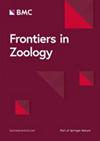利用数据压缩法对仓鼠的可选狩猎行为进行比较分析
IF 2.6
2区 生物学
Q1 ZOOLOGY
引用次数: 0
摘要
对蓖麻科动物狩猎行为的研究提供了一个机会,可以揭示当一种啮齿类动物从杂食性生活方式转变为捕食性生活方式时,捕食行为序列会发生哪些变化。本研究检验了以下假设:仓鼠捕食生活方式的物种分化是否存在系统发育差异,还是生态因素导致了其捕食行为的形成?我们采用数据压缩方法对作为生物 "文本 "的狩猎模式进行了比较分析。本研究对五种仓鼠的狩猎行为进行了比较分析,重点研究了沙漠仓鼠 Phodopus roborovskii 的新数据,此前从未对其狩猎行为进行过研究。P. roborovskii的狩猎行为似乎是最多变的。相比之下,P. campbelli 和 Allocricetulus curtatus 的行为序列在捕猎过程中表现出更明显的行为顺序和可预测性。最古老的物种P. roborovskii的可选捕猎行为与 "年轻 "的Allocricetulus物种的强制性模式相似。因此,它被证明是 Phodopus 属中最先进的狩猎者。Phodopus代表物种之间狩猎序列的差异表明,尽管这些物种的狩猎模式是可选的,但在属内物种分裂过程中,它们的狩猎行为是经过选择的。这些结果并未揭示系统发育差异在物种捕食生活方式分化中所起的作用。他们认为生态条件是仓鼠狩猎行为物种分化的主要因素。本文章由计算机程序翻译,如有差异,请以英文原文为准。
Comparative analysis of optional hunting behavior in Cricetinae hamsters using the data compression approach
Research into the hunting behavior in members of the Cricetidae family offers an opportunity to reveal what changes in the predatory behavioral sequences occur when a rodent species shifts from an omnivorous to a predatory lifestyle. The study tests the following hypotheses: are there phylogenetic differences in the divergence of species’ predatory lifestyles in hamsters or do ecological factors lead to shaping their hunting behavior? We applied the data compression approach for performing comparative analysis of hunting patterns as biological “texts.” The study presents a comparative analysis of hunting behaviors in five Cricetinae species, focusing on the new data obtained for the desert hamster Phodopus roborovskii whose behavior has never been studied before. The hunting behavior of P. roborovskii appeared to be the most variable one. In contrast, behavioral sequences in P. campbelli and Allocricetulus curtatus display more significant order and predictability of behavior during hunting. Optional hunting behavior in the most ancient species P. roborovskii displayed similarities with obligate patterns in “young” Allocricetulus species. It thus turned out to be the most advanced hunter among members of the Phodopus genus. Differences in hunting sequences among Phodopus representatives suggest that the hunting behavior of these species, despite its optional mode, was subject to selection during species splitting within the genus. These results did not reveal the role played by phylogenetic differences in the divergence of species’ predatory lifestyles. They suggested that ecological conditions are the main factors in speciation of the hunting behavior in hamsters.
求助全文
通过发布文献求助,成功后即可免费获取论文全文。
去求助
来源期刊

Frontiers in Zoology
ZOOLOGY-
CiteScore
4.90
自引率
0.00%
发文量
29
审稿时长
>12 weeks
期刊介绍:
Frontiers in Zoology is an open access, peer-reviewed online journal publishing high quality research articles and reviews on all aspects of animal life.
As a biological discipline, zoology has one of the longest histories. Today it occasionally appears as though, due to the rapid expansion of life sciences, zoology has been replaced by more or less independent sub-disciplines amongst which exchange is often sparse. However, the recent advance of molecular methodology into "classical" fields of biology, and the development of theories that can explain phenomena on different levels of organisation, has led to a re-integration of zoological disciplines promoting a broader than usual approach to zoological questions. Zoology has re-emerged as an integrative discipline encompassing the most diverse aspects of animal life, from the level of the gene to the level of the ecosystem.
Frontiers in Zoology is the first open access journal focusing on zoology as a whole. It aims to represent and re-unite the various disciplines that look at animal life from different perspectives and at providing the basis for a comprehensive understanding of zoological phenomena on all levels of analysis. Frontiers in Zoology provides a unique opportunity to publish high quality research and reviews on zoological issues that will be internationally accessible to any reader at no cost.
The journal was initiated and is supported by the Deutsche Zoologische Gesellschaft, one of the largest national zoological societies with more than a century-long tradition in promoting high-level zoological research.
 求助内容:
求助内容: 应助结果提醒方式:
应助结果提醒方式:


